|
|
|
Sort Order |
|
|
|
Items / Page
|
|
|
|
|
|
|
| Srl | Item |
| 1 |
ID:
144241
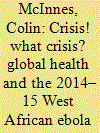

|
|
|
|
|
| Summary/Abstract |
This article examines why the 2014–15 outbreak of Ebola in West Africa, which subsequently spread more widely, was understood as a crisis. It begins from the basis that there was nothing ‘natural’ about it being considered a crisis; rather it was socially constructed as such. Specifically it suggests that the outbreak could be understood as a crisis because of the way in which it resonated with the global health narrative. The article examines how the elements which constitute this narrative – the effects of globalisation, the emergence of new risks and the requirement for new political responses – are fundamental to how Ebola was understood as a crisis.
|
|
|
|
|
|
|
|
|
|
|
|
|
|
|
|
| 2 |
ID:
144240
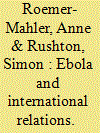

|
|
|
|
|
| Summary/Abstract |
The outbreak of Ebola Virus Disease (EVD) that gripped Liberia, Guinea and Sierra Leone through much of 2014 and 2015 was an enormous and in many ways unprecedented health emergency. Yet the outbreak was not only a global health event – it was also a global political event. In this introduction to the special issue we discuss the contribution that International Relations scholarship can make to analysing and understanding the Ebola outbreak and the global response to it. We group our comments around four key themes: (1) allocating responsibility in a diffuse global health governance system; (2) the causes and effects of Ebola being perceived as a global crisis; (3) the downsides of a security-driven approach to global health emergencies; and (4) issues of inequality both between and within countries, including those around gender, resources and power.
|
|
|
|
|
|
|
|
|
|
|
|
|
|
|
|
| 3 |
ID:
144250
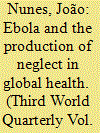

|
|
|
|
|
| Summary/Abstract |
This article argues that the 2014 Ebola outbreak in West Africa reinscribed the neglect that has surrounded this disease. The argument develops theoretical tools for understanding how neglect is produced in global health. Arguing that neglect is connected with the production of harm and vulnerability, it stresses the importance of emotions in issue-prioritisation in global health. Focusing on the dynamics of abjection, the article shows how the 2014 Ebola outbreak was framed as a (racialised) African problem and obfuscated by a political and media spectacle. The result was the preference for short-term crisis-management responses that detracted from long-term structural solutions.
|
|
|
|
|
|
|
|
|
|
|
|
|
|
|
|
| 4 |
ID:
144245
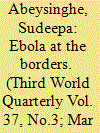

|
|
|
|
|
| Summary/Abstract |
As well as a site of politics and public health action, the outbreak of Ebola in West Africa has been a focus of media representations. This paper examines print media narratives around border control in relation to Ebola in the UK, the USA and Australia from the start of the epidemic to May 2015. It shows that Ebola became mobilised as a frame through which domestic politics could be discussed. The disease was transformed from a problem for West Africa to a problem for the West. The context of West Africa and affected populations was homogenised and hidden. The focus of reporting centred upon domestic political actions and more local sources of threat.
|
|
|
|
|
|
|
|
|
|
|
|
|
|
|
|
| 5 |
ID:
144244
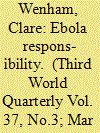

|
|
|
|
|
| Summary/Abstract |
Combating threats of infectious diseases has been increasingly framed as a global shared responsibility for a multi-actor framework of states, international organisations and nongovernmental actors. However, the outbreak of Ebola Virus Disease (EVD) has shown that this governance framework has not been able to limit the spread of this virus, despite the normative and legislative changes to global disease control. By unbundling the concept of responsibility, this article will assess how global shared responsibility may have failed because accountability does not fall on any one state or stakeholder, highlighting an inherent weakness in the global disease governance regime. The paper concludes that a move towards multiple responsibilities may prove a more effective mechanism for ensuring global health security.
|
|
|
|
|
|
|
|
|
|
|
|
|
|
|
|
| 6 |
ID:
144249
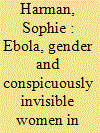

|
|
|
|
|
| Summary/Abstract |
The international response to Ebola brings into stark contention the conspicuous invisibility of women and gender in global health governance. Developing feminist research on gender blindness, care and male bias, this article uses Ebola as a case to explore how global health rests on the conspicuous free labour of women in formal and informal care roles, yet renders women invisible in policy and practice. The article does so by demonstrating the conspicuous invisibility of women and gender in narratives on Ebola, emergency and long-term strategies to contain the disease, and in the health system strengthening plans of the World Health Organization and World Bank.
|
|
|
|
|
|
|
|
|
|
|
|
|
|
|
|
| 7 |
ID:
144246


|
|
|
|
|
| Summary/Abstract |
This article identifies the long-term political factors that contributed to the Ebola crisis in Sierra Leone, factors which are largely overlooked by the emerging international focus on building resilient health systems. We argue that the country exhibits critical symptoms of the recurrent crises of a gatekeeper state, including acute external dependency, patron–client politics, endemic corruption and weak state capacity. A coterie of actors, both internal and external to Sierra Leone, has severely compromised the health system. This left certain sections of the population acutely at risk from Ebola and highlights the need for political solutions to build stronger, inclusive health systems.
|
|
|
|
|
|
|
|
|
|
|
|
|
|
|
|
| 8 |
ID:
144248
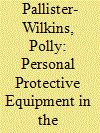

|
|
|
|
|
| Summary/Abstract |
This article focuses on the use of Personal Protective Equipment in humanitarianism. It takes the recent Ebola outbreak as a case through which to explore the role of objects in saving individual lives and protecting populations. The argument underlines the importance of PPE in mediating between individual patient care and biosecurity. In addition it questions the preoccupation with technical fixes; challenges dominant perceptions about the subject of humanitarianism being the victims of disaster; traces the production of a particular politics of life; and explores the individualisation of risk and concomitant processes of labour discipline in the everyday lives of humanitarian workers.
|
|
|
|
|
|
|
|
|
|
|
|
|
|
|
|
| 9 |
ID:
144243
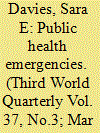

|
|
|
|
|
| Summary/Abstract |
The UN Security Council meeting on 18 September 2014 represented a major turning-point in the international response to the Ebola outbreak then underway in West Africa. However, in the light of widespread criticism over the tardiness of the international response, it can be argued that the UN, and particularly the Security Council, failed to make best use of a potential resource it already had on the ground in Liberia: the United Nations Mission in Liberia (UNMIL). This article examines whether UNMIL could have done more to contribute to the emergency response and attempts to draw some lessons from this experience for potential peacekeeper involvement in future public health emergencies. UNMIL could have done more than it did within the terms of its mandate, although it may well have been hampered by factors such as its own capacities, the views of Troop Contributing Countries and the approach taken by the Liberian government. This case can inform broader discussions over the provision of medical and other forms of humanitarian assistance by peacekeeping missions, such as the danger of politicising humanitarian aid and peacekeepers doing more harm than good. Finally, we warn that a reliance on peacekeepers to deliver health services during ‘normal’ times could foster a dangerous culture of dependency, hampering emergency responses if the need arises.
|
|
|
|
|
|
|
|
|
|
|
|
|
|
|
|
| 10 |
ID:
144247
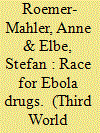

|
|
|
|
|
| Summary/Abstract |
The international Ebola response mirrors two broader trends in global health governance: (1) the framing of infectious disease outbreaks as a security threat; and (2) a tendency to respond by providing medicines and vaccines. This article identifies three mechanisms that interlink these trends. First, securitisation encourages technological policy responses. Second, it creates an exceptional political space in which pharmaceutical development can be freed from constraints. Third, it creates an institutional architecture that facilitates pharmaceutical policy responses. The ways in which the securitisation of health reinforces pharmaceutical policy strategies must, the article concludes, be included in ongoing efforts to evaluate them normatively and politically.
|
|
|
|
|
|
|
|
|
|
|
|
|
|
|
|
| 11 |
ID:
144242


|
|
|
|
|
| Summary/Abstract |
Since 2001 the World Health Organization (WHO) has been actively promoting its credentials for managing ‘global health security’. However, the organisation’s initial response to the 2014 Ebola outbreak in West Africa has attracted significant criticism, even prompting calls for its dissolution and the creation of a new global health agency. Drawing on principal–agent theory and insights from previous disease outbreaks, this article examines what went wrong, the extent to which the organisation can be held to account, and what this means for the WHO’s global health security mandate.
|
|
|
|
|
|
|
|
|
|
|
|
|
|
|
|
|
|
|
|
|